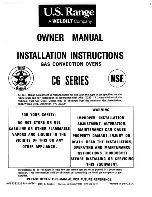
5-4
Samsung Electronics
Alignment and Adjustments
5-11 Leakage Measuring Procedure
5-8 Procedure for Measurement of Microwave Energy Leakage
5-10 Note on Measurement
5-9 Check for Microwave Leakage
5-11-1 Record keeping and notification after measurement
1) After adjustment and repair of a radiarion preventing device, make a repair record for the measured
values, and keep the data.
2) If the radiation leakage is more than 5 mW/cm
2
after determining that all parts are in good condition,
functioning properly and the identical parts are replaced as listed in this manual notift that fact to ;
CENTRAL SERVICE CENTER
5-11-2 At least once a year have the microwave energy survey meter checked for accuracy by its
manufacturer.
1. Remove the outer panel.
2. Pour 275±15cc of 20±5˚C(68±9˚F) water in a
beaker which is graduated to 600cc, and
place the beaker in the center of the oven.
3. Start the oven at the highest power level.
4. Set survey meter dual ranges to 2,450MHz.
5. Using the survey meter and spacer cone as
described above, measure arnear the
opening of magnetron, the surface of the air
guide and the surface of the wave guide as
shown in the following photo.( but avoid the
high voltage components.) The neading
should be less than 5mW/cm
2
.
1) Do not exceed the limited scale.
2) The test probe must be held on the grip of the handle, otherwise a false reading may result when the
operator's hand is between the handle and the probe.
3) When high leakage is suspected, do not move the probe horizontally along the oven surface; this may
cause damage to the probe.
4) Follow the recommendation of the manufacturer of the microwave energy survey meter.
1) Pour 275±15cc of 20±5˚C(68±9˚F) water in a beaker
which is graduated to 600cc, and place the beaker in
the center of the oven.
2) Start to operate the oven and measure the leakage
by using a microwave energy survey meter.
3) Set survey meter with dual ranges to 2,450MHz.
4) When measuring the leakage, always use the 2 inch
spacer cone with the probe. Hold the probe
perpendicular to the cabinet door. Place the spacer
cone of the probe on the door and/or cabinet door
seam and move along the seam, the door viewing
window and the exhaust openings moving the
probe in a clockwise direction at a rate of 1 inch/sec.
If the leakage testing of the cabinet door seam is taken near a corner of the door, keep the probe
perpendicular to the areas making sure that the probe end at the base of the cone does not get closer than
5cm to any metal. If it gets closer than 5cm, erroneous readings may result.
5) Measured leakage must be less than 4mW/cm
2
, after repair or adjustment.
Maximum allowable leakage is 5mW/cm
2
.
4mW/cm
2
is used to allow for measurement and meter accuracy







































